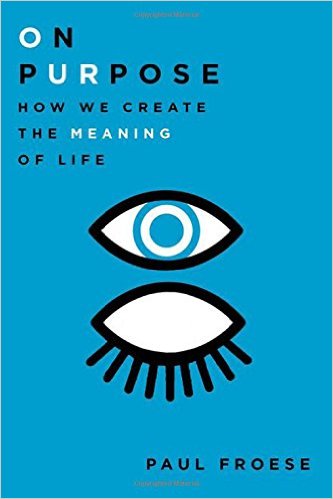
 Religion Watch recently interviewed ISR fellow and Baylor University sociologist Paul Froese about his new book, On Purpose: How We Create the Meaning of Life (Oxford University Press, $27.95).
Religion Watch recently interviewed ISR fellow and Baylor University sociologist Paul Froese about his new book, On Purpose: How We Create the Meaning of Life (Oxford University Press, $27.95).
RW: You have previously studied and written about religious repression in Russia and people’s images of God. Was it a challenge to write on such a vast subject as life’s meaning and purpose, especially for a sociologist?
Froese: Writing a book on purpose was the hardest thing I have ever done because the breadth of the topic is infinite. That said, approaching the topic as a sociologist provided ballast. While in the weeds of endless philosophical complexity, I was always led back to the foundation of community and social context in determining each individual’s system of values and meaning.
Each chapter delves into a different layer of meaning and begins with a question for the reader—it is intended to set the stage for the discussion that follows. They are 1) our shared assumptions about purpose, 2) the possibility of meaninglessness, 3) the ways in which people discover themselves, 4) the moral certitude some people feel, 5) the effects of social time, and 6) the limits of power in deciding our purposes.
RW: Early on in the book, you discuss findings showing that secular countries have a lower rate of people claiming that life is meaningful but that such a deficit is distributed more toward the deprived in these societies. Can you explain that?
Froese: Although religion is undeniably the source of meaning and purpose for most people in the world, it is not secularism per se which robs people of a sense of purpose. Rather it is the fact that modernity produced a plurality of existential choices, one of which is the possibility that everything is meaningless. This possibility looms most precariously for those who live in isolation within wealthier countries, which tend to be more secular.
People in poverty within less modernized countries may live lives of untold desperation, but they are more likely to persist within a larger religious culture imbued with meaning. They may not be happy, but they feel purposeful. In contrast, the disadvantaged within wealthy countries suffer from not only relative deprivation but also existential deprivation. They persist within cultures that provide little meaning to those who are not successful; they feel left behind and useless within societies which derive their meaning from economic success and technological progress.
A new breed of pro-Israel activism is emerging that is drawing Hispanic and younger evangelicals into its fold as well as using social media to spread the Christian Zionist message, according to Charisma magazine (September). These groups are responding to reports of growing anti-Semitic incidents and seeking to lead “more people to stand for Israel […]
While Brazilian-American evangelicals are following the trajectory of other ethnic groups through their 1.5 (those who immigrated to the U.S. while still children) and 2nd generations assimilating and moving into the evangelical mainstream, Brazilian spiritualist groups are becoming multi-cultural and English-speaking even before the second generation comes of age, according to research presented at the […]
Even though there have been over 100,000 gay weddings since the Supreme Court legalized same-sex marriage last year, these ceremonies are still relatively rare events for most clergy. Only 11 percent of Protestant senior pastors are being asked to perform such ceremonies, according to a survey by Lifeway Research. As might be expected, more liberal, […]
Catholicism is experiencing something of a renewal in Great Britain, ranging from the Catholic vitality of the Anglo-Indians to a “new sense of purpose and mission, and indeed of vocation…among the ‘creative minority’ of Mass-going adults,” writes Stephen Bullivant in the London-based Catholic Herald (August 11). Bullivant reports on the opening of “new cathedrals, new […]
From a lone pastor offering “drop-in” nuptials in 2008, these unscheduled types of services for weddings and baptisms have proliferated in the Church of Sweden today, possibly making new connections between parishes and inactive members, reports The Christian Century (August 3). When Pastor Jerker Alsterlund first perform unscheduled weddings at his church in the city […]
The growth and dynamism of Pentecostalism in Australia is attracting attention, especially in the Sydney area and New South Wales writes Paul Oslington, a professor of economics who is himself an Anglican but teaches at Alphacrucis College, the national college of the Australian Pentecostal movement, for the Australian Broadcasting Company (August 26). Sydney is home […]
Islamic-oriented humanitarian NGOs have flourished in Turkey in recent years, but their “parallelism” to the foreign policy implementation process of the current Turkish (AKP) government potentially makes their status ambiguous as non-governmental entities. This ambiguity also places them at risk in relation to changing perceptions of Turkey in areas where they operate, write Nihat Çelik […]
While the strong significance of and veneration for its current leader, Daisaku Ikeda (b. 1928), is obvious to anybody reading Soka Gakkai publications, the lay Buddhist movement does not intend to transfer this status to a successor, writes Ulrich Dehn (University of Hamburg, Germany) in an overview of the movement published in the journal Materialdienst […]
The Research on Religion podcast, sponsored by Baylor’s Institute for Studies of Religion, recently marked its 300th episode. The podcast, founded in 2010 and hosted by Anthony Gill, a political science professor at the University of Washington, draws about 5,000 listeners to its interviews with both religion scholars and practitioners. The podcasts, which are geared […]